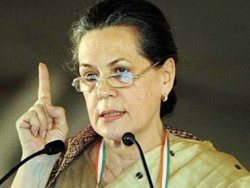New Delhi, March 27: Rejecting the dialogue offer on the controversial land bill, Sonia Gandhi on Friday alleged it was a mockery of the consensus building tradition by a “myopic” Modi government which was “bending backwards” to favour industrialists and demanded that UPA’s legislation be brought back in totality.
“Proposition of a post-facto debate after unilateral imposition of anti-farmer law is mockery of building partisan consensus,” the Congress president said replying in a strongly worded letter to Union Minister Nitin Gadkari.
Chiding the government for painting those opposing its Land Bill as anti-nationals, Ms. Gandhi asked the government to “rise above its narrow-minded politics”.
Hailing farmers as the “backbone” of the country, Ms. Gandhi said the Congress cannot support any law which hurts farmers, and asked the Modi government to bring back UPA’s land bill in totality.
Ms. Gandhi said it was regrettable that anyone championing the cause of distressed farmers and needy farm labourers was being branded as “anti-national” by a “myopic Modi government bending backwards to favour select industrialists”.
She said the fundamental difference between the Congress and the BJP is in understanding farmer’s distress and loss of livelihood by acquisition of land without safeguards.
Being pro-farmer does not mean anti-growth, she said.
Last week, Mr. Gadkari had written to Ms. Gandhi and leaders of other opposition parties and social activist Anna Hazare and invited them to an open debate on the issue while asserting that the bill was “very much in farmers’ interest”.
Faced with stiff opposition on the land bill, the government had reached out to leaders of opposition parties, with Union Transport and Shipping Minister Nitin Gadkari telling them that the government was willing to debate all aspects of the bill which is awaiting clearance in the Rajya Sabha.





Comments
Add new comment